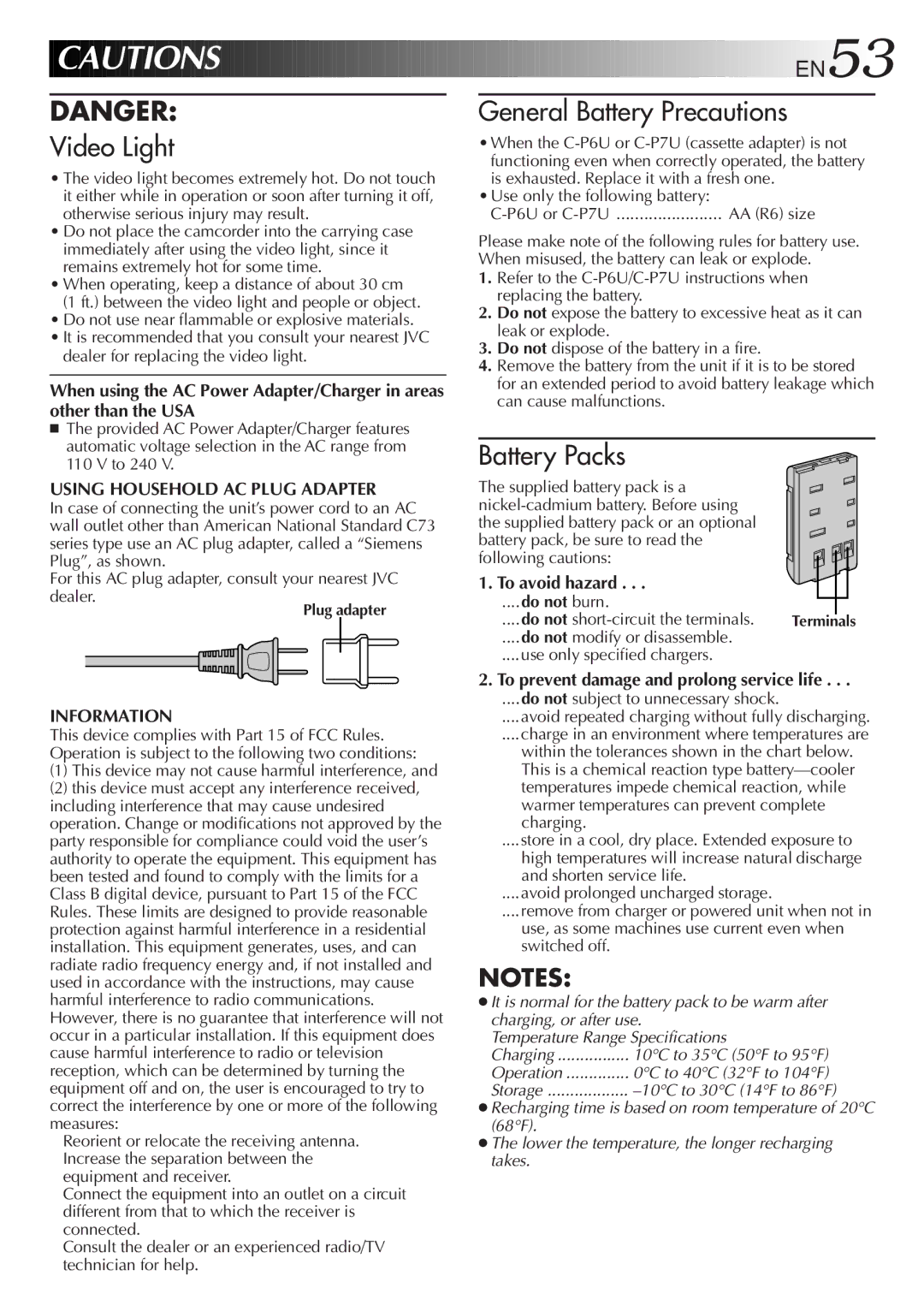
| CAUTIONS |
|
|
| EN |
| 53 | |||
|
|
|
|
| ||||||
|
|
|
|
|
|
|
|
| ||
DANGER: | General Battery Precautions |
|
|
|
|
| ||||
Video Light | •When the | |||||||||
|
|
|
| |||||||
• The video light becomes extremely hot. Do not touch | functioning even when correctly operated, the battery | |||||||||
is exhausted. Replace it with a fresh one. |
|
|
|
|
| |||||
| it either while in operation or soon after turning it off, | •Use only the following battery: |
|
|
|
|
| |||
| otherwise serious injury may result. | |||||||||
• Do not place the camcorder into the carrying case | Please make note of the following rules for battery use. | |||||||||
| immediately after using the video light, since it | |||||||||
| When misused, the battery can leak or explode. | |||||||||
| remains extremely hot for some time. | |||||||||
| 1. Refer to the | |||||||||
• When operating, keep a distance of about 30 cm | ||||||||||
replacing the battery. |
|
|
|
|
| |||||
| (1 ft.) between the video light and people or object. |
|
|
|
|
| ||||
| 2. Do not expose the battery to excessive heat as it can | |||||||||
• Do not use near flammable or explosive materials. | ||||||||||
leak or explode. |
|
|
|
|
| |||||
• It is recommended that you consult your nearest JVC |
|
|
|
|
| |||||
3. Do not dispose of the battery in a fire. |
|
|
|
|
| |||||
| dealer for replacing the video light. |
|
|
|
|
| ||||
| 4. Remove the battery from the unit if it is to be stored | |||||||||
|
|
|
| |||||||
When using the AC Power Adapter/Charger in areas | for an extended period to avoid battery leakage which | |||||||||
can cause malfunctions. |
|
|
|
|
| |||||
other than the USA |
|
|
|
|
| |||||
|
|
|
|
|
| |||||
■ The provided AC Power Adapter/Charger features |
|
|
|
|
|
| ||||
| automatic voltage selection in the AC range from | Battery Packs |
|
|
|
|
| |||
| 110 V to 240 V. |
|
|
|
|
| ||||
USING HOUSEHOLD AC PLUG ADAPTER | The supplied battery pack is a |
|
|
|
|
| ||||
In case of connecting the unit’s power cord to an AC |
|
|
|
|
| |||||
wall outlet other than American National Standard C73 | the supplied battery pack or an optional |
|
|
|
|
| ||||
series type use an AC plug adapter, called a “Siemens | battery pack, be sure to read the |
|
|
|
|
| ||||
Plug”, as shown. | following cautions: |
|
|
|
|
| ||||
For this AC plug adapter, consult your nearest JVC | 1. To avoid hazard . . . |
|
|
|
|
| ||||
dealer. | ....do not burn. |
|
|
|
|
| ||||
|
|
| Plug adapter |
|
|
|
|
| ||
|
|
| ....do not | Terminals | ||||||
|
|
|
| |||||||
|
|
|
| ....do not modify or disassemble. |
|
|
|
|
| |
|
|
|
| ....use only specified chargers. |
|
|
|
|
| |
|
|
|
|
|
|
|
|
| ||
INFORMATION
This device complies with Part 15 of FCC Rules. Operation is subject to the following two conditions:
(1)This device may not cause harmful interference, and
(2)this device must accept any interference received, including interference that may cause undesired operation. Change or modifications not approved by the party responsible for compliance could void the user’s authority to operate the equipment. This equipment has been tested and found to comply with the limits for a Class B digital device, pursuant to Part 15 of the FCC Rules. These limits are designed to provide reasonable protection against harmful interference in a residential installation. This equipment generates, uses, and can radiate radio frequency energy and, if not installed and used in accordance with the instructions, may cause harmful interference to radio communications. However, there is no guarantee that interference will not occur in a particular installation. If this equipment does cause harmful interference to radio or television reception, which can be determined by turning the equipment off and on, the user is encouraged to try to correct the interference by one or more of the following measures:
Reorient or relocate the receiving antenna. Increase the separation between the equipment and receiver.
Connect the equipment into an outlet on a circuit different from that to which the receiver is connected.
Consult the dealer or an experienced radio/TV technician for help.
2.To prevent damage and prolong service life . . .
....do not subject to unnecessary shock.
....avoid repeated charging without fully discharging.
....charge in an environment where temperatures are within the tolerances shown in the chart below. This is a chemical reaction type
....store in a cool, dry place. Extended exposure to high temperatures will increase natural discharge and shorten service life.
....avoid prolonged uncharged storage.
....remove from charger or powered unit when not in use, as some machines use current even when switched off.
NOTES:
●It is normal for the battery pack to be warm after charging, or after use.
Temperature Range Specifications
Charging ................ 10°C to 35°C (50°F to 95°F) Operation .............. 0°C to 40°C (32°F to 104°F) Storage ..................
●Recharging time is based on room temperature of 20°C (68°F).
●The lower the temperature, the longer recharging takes.
